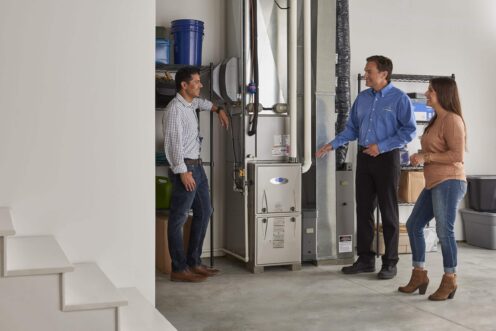
The heating system in your house plays an unsung hero’s role when winter approaches, ensuring that you remain warm and cozy. But heaters, like other equipment, have a life expectancy and eventually need replacement. To avoid unanticipated failures and to keep your house warm when you need heat the most, it’s important to know the warning indications that your heater is about to die. This article will help you choose the right heating system for your house by going over six telltale signals that it’s time to replace your heater.
1. Strange Noises
If you hear strange noises coming from your heater, it’s probably a sign that something is wrong. Noises like pounding, clanging, or screeching may indicate that a part is about to break. These unusual noises can be the result of components becoming loose or malfunctioning due to normal wear and tear. Ignoring these sounds might lead to a total collapse of your heating system. If your heater is sounding more like a percussion instrument than a well-functioning appliance, it might be time to invest in a new one.
2. Rising Heating Costs
Be wary of a sudden and dramatic rise in your heating costs if your use has not increased at the same rate. Heaters lose efficiency as they age and need more energy to produce the same quantity of heat. You’ll notice this increased workload in your monthly bills. It may be more economical to upgrade to a more energy-efficient heater in the long term if you’ve seen a constant increase in heating expenditures despite regular use patterns.
3. Frequent Repairs
A heater that needs constant repairs will quickly become an expensive burden, even if occasional maintenance is typical. Parts wear out, and heaters break down more often as they get older. This is why it’s helpful to think about getting a new, dependable heating system instead of spending a ton of money on fixing your current system all the time. It will not only cause you less hassle, but it will also provide greater indoor comfort.
4. Visible Signs of Damage
Be sure to check for obvious damage to your heating system on a frequent basis. Rust, corrosion, or heat exchanger cracks can make your heater inefficient and even dangerous. Always act quickly in the event that you see water collecting around the unit or obvious damage to important parts. While it’s feasible to fix some damage, replacing your heating system is usually the safest and most effective option when the damage is significant.
5. Poor Indoor Comfort
The heating system’s principal role is to maintain a constant and pleasant temperature within your home. An obvious sign of deteriorating performance is if you notice that certain parts of your home are always cooler than others or if your heater has trouble maintaining a reasonable temperature across the house. Problems with efficiency can arise from aging components, reduced system capacity, or an outdated design. Improving interior comfort and achieving uniform heating throughout your home are two benefits of upgrading to a more modern and energy-efficient heating system.
6. Old Age
When determining if your heating system is still viable, age plays a major role. Depending on variables such as use, maintenance, and unit quality, the lifetime of most heaters may range from 15 to 20 years. You should start thinking about getting a new heater if yours is getting close to or has gone beyond its expected lifetime. Heaters, even when they seem to be working, are more likely to have unexpected malfunctions and higher energy bills as they age.
How to Pick the Best Heating System for Your Home
Choosing the correct heating system for your house is essential when you need to replace your heater. To get the most out of your system and keep your energy bills down, try to get one with a high ENERGY STAR rating. Consider the square footage of your property as well as its heating needs. A system that is either too big or too small will lead to inefficient heating and poor indoor comfort. Think about your needs and the resources available in your area while deciding between natural gas, electricity, or other fuel possibilities. For optimal control and efficiency, think about getting a heater with a smart thermostat and energy-saving features.
Apollo Heating & Air Conditioning helps Bellevue homeowners with all of their heating and cooling needs. We also specialize in indoor air quality testing, duct cleaning, and commercial HVAC. Contact us today to learn how you can save money with one of our comprehensive maintenance plans or to discuss whether it’s time to install a new heater.
Contact Apollo Heating & Air Conditioning today!
